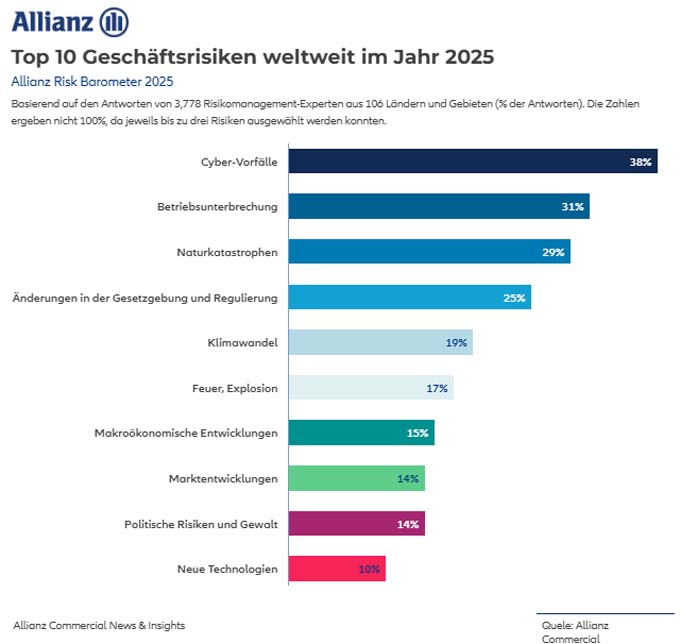Allianz Risk Barometer: Cyber attacks remain top global risk for companies in 2025
Allianz Commercial publishes its 14th annual "Allianz Risk Barometer" survey on the most important business risks worldwide, in which 3,778 respondents from 106 countries took part. Cyber incidents and business interruptions are ranked first and second both globally and in Switzerland, followed by natural disasters in third place worldwide, while in Switzerland, as in 2024, changes to laws and regulations such as customs duties, sanctions or protectionist efforts are still causing headaches for companies.

Cyber incidents such as data breaches, ransomware attacks and IT outages, such as the CrowdStrike incident in the summer, are once again the biggest risk for companies worldwide this year. Business interruptions follow in second place, regardless of company size. After another year of extreme weather events, natural disasters are back in third place in the global ranking, while the super election year of 2024, rising geopolitical tensions and potential trade wars ensure that changes to laws and regulations outside Switzerland remain in fourth place (Switzerland in third place). Climate change makes the biggest leap in this year's Allianz Risk Barometer, rising from 7th to 5th place, its highest ranking since the study was compiled.

Companies of all sizes rate cyber incidents as their biggest business risk. However, there are significant differences in the rest of the ranking. Smaller companies are concerned about local and immediate risks such as regulatory compliance, macroeconomic developments and skills shortages. However, there are also signs that some of the risks that traditionally concern larger companies are now also affecting smaller companies. These include climate change, political risks and violence.
Skills shortage still among the top 5 risks
Among the participants in the study from Switzerland, cyber attacks and business interruptions were also ranked 1st (2024: 1st) and 2nd (2024: 2nd). In contrast to the global ranking, changes to laws and regulations occupy 3rd place, as they did in 2024. As in the previous year, the shortage of skilled workers is perceived as a major risk in Switzerland. In this country, it is in 4th place, compared to 11th place worldwide.

Vanessa Maxwell, Chief Underwriting Officer of Allianz Commercial, comments on the results: "2024 was an exceptional year for risk management. The results of our annual Allianz Risk Barometer reflect the uncertainty faced by many businesses around the world. The interconnectedness of the top risks is particularly striking this year, as climate change, new technologies, regulation and geopolitical risks are increasingly intertwined. This leads to complex cause and effect relationships. Companies need to put resilience at the top of their agenda and consistently strive to improve their risk management and resilience."
Cyber risks increase with technological progress
Cyber incidents (38%) are the main risk for companies for the fourth time in a row and for the first time with a clear lead of seven percentage points. Cyber is the top risk in 20 countries, including Switzerland, Argentina, Germany, France, the UK, India, South Africa and the USA. More than 60 percent of respondents cite data breaches as the most worrying threat, ahead of attacks on critical infrastructure or assets (57 percent).
"Many companies cite cyber as the biggest risk, which is being exacerbated by the rapid development of artificial intelligence. Given the increasing dependence on technology, it is likely to remain a key risk for companies in the future. The CrowdStrike incident in the summer of 2024 reminded us how dependent we all are on secure IT systems," says Rishi Baviskar, Global Head of Cyber Risk Consulting at Allianz Commercial.
Business interruptions are closely linked to other risks
Business interruption (BI) has been ranked either first or second in every Allianz Risk Barometer for the past ten years. With 31 percent of responses, it will remain in second place in 2025 - both globally and in Switzerland. BI are usually the result of events such as natural disasters or cyberattacks that disrupt or interrupt a company's operations. Several examples from 2024 show why companies still see them as a major threat to their business model.
For example, Houthi attacks in the Red Sea led to supply chain disruptions as container ships had to be diverted, while incidents such as the collapse of the Francis Scott Key Bridge in Baltimore also had a direct impact on global and local supply chains. Supply chain disruptions with a global impact occur approximately every 1.4 years, with an increasing trend, according to an analysis by Circular Republic in collaboration with Allianz and others. They cause additional downtime and significant economic damage, accounting for between five and ten percent of product costs.
"The pursuit of technological progress and efficiency has an impact on the resilience of supply chains. Automation and digitalization have significantly accelerated processes. When implemented effectively, these technologies increase resilience by providing better data analytics, predictions and more agile response capabilities. For this reason, building and investing in resilience is becoming more important for every organization," says Michael Bruch, Global Head of Risk Advisory Services at Allianz Commercial.
Climate change is increasing in risk perception
2024 was the hottest year since weather records began. It was also a year of terrible natural disasters with extreme hurricanes and storms in North America, devastating floods in Europe and Asia and drought in Africa and South America. After slipping down the rankings in the years of the coronavirus pandemic as companies had to deal with more immediate challenges, climate change moved up two positions in the top 5 global risks in 2025. With 5th place worldwide, as well as in Switzerland, it reaches its highest position to date. In the previous year, it was still in 10th place in the Swiss ranking, which shows that awareness of the problem has increased significantly.
Natural catastrophes closely linked to climate change remain in third place worldwide at 29%, while in Switzerland they are in sixth place. For the fifth time in a row, insured losses exceeded 100 billion US dollars in 2024. Greece, Hong Kong, Japan, Croatia, Austria, Romania, Slovenia, Spain and Turkey, where some of the most severe events occurred in 2024, rank natural catastrophes as the greatest risk. In Central and Eastern Europe and Spain, storms and floods had a dramatic impact on people and businesses.
According to the German Insurance Association, the insured losses from the floods in southern Germany in June 2024 alone amounted to around two billion euros. These effects underline the importance of prevention and damage limitation through cooperation between governments, insurers and local authorities.
Geopolitics and protectionism remain on companies' radar
Despite ongoing geopolitical and economic uncertainty in the Middle East, Ukraine and South East Asia, political risks and violence fall to 9th place worldwide (2024: 8th), while they are no longer even in the top 10 in Switzerland, in stark contrast to the previous year, when they were still in 4th place in this country. However, they remain an increased risk for large companies (7th place), while smaller companies now rank them in 10th place.
Fears of trade wars and protectionism are on the rise. Analysis by Allianz and others shows that export restrictions on critical commodities have increased fivefold in the last ten years. Tariffs and protectionism may be at the top of the new US administration's list, but on the other hand, there is also a risk of a "regulatory Wild West", particularly in relation to AI and cryptocurrencies. In Europe, sustainability reporting requirements will be at the top of the agenda in 2025.
"The impact of new tariffs will be similar to that of (over)regulation: rising costs for all affected companies," explains Ludovic Subran, Chief Economist at Allianz. "Not all regulation is inherently 'bad'. In most cases, it is the implementation that makes business life more difficult. The focus should not only be on the number of rules, but also on efficient administration. A thorough digitalization of the authorities is urgently needed. However, we will probably still be waiting in vain for a corresponding digital strategy in 2025. Instead, trade wars are looming. The prospects are not rosy," Subran continues.
Source: www.commercial.allianz.com
This article originally appeared on m-q.ch - https://www.m-q.ch/de/allianz-risk-barometer-cyber-attacken-bleiben-2025-weltweites-top-risiko-fuer-unternehmen/









